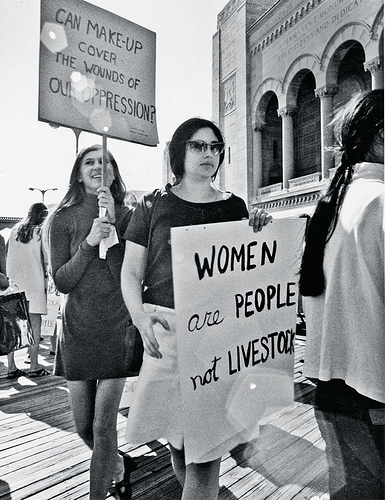The mark the fiftieth anniversary of the launch of the women’s liberation movement, Charlotte Shane reflects on intergenerational feminist conflict for Bookforum. Shane recalls that many second-wave feminists of the late 1960s and '70s denounced their feminist forbearers for being too traditional, only to later be denounced for the same reasons by third-wave feminists. These disputes, writes Shane, were often framed as “mother-daughter” conflicts, a metaphor that undermined intergenerational solidarity and ultimately hampered the feminist movement. Here’s an excerpt from Shane’s piece:
“Young, self-described radical women . . . distanced themselves from their more liberal, and often older, feminist contemporaries in order to herald themselves as the harbingers of something new,” writes Astrid Henry in Not My Mother’s Sister: Generational Conflict and Third-Wave Feminism, her thorough, fascinating investigation into the idea of waves in activism and the unfortunate reality such thinking creates. Older contemporaries were, to some extent, willing to play along with the pretense that the movement’s relevance and legitimacy should be determined by its youngest members. In “The Florida Paper,” for instance, Jones identifies as “a middle-aged female accustomed to looking to militant youth for radical leadership.” She was forty-one at the time, a mother, and married (to the academic who would name Gainesville “the Berkeley of the South”). In more substantial ways, Jones actually was the epitome of what radicals disdained. In a 1992 interview, she called herself an “authoritarian” who “never had a job” and seemed outraged at her interlocutor’s suggestion that she might feel guilty or conflicted about having a maid. Yet she was responsible for a paper that helped determine the course of this ostensibly youth-led, ostensibly radical movement.
In Henry’s convincing analysis, the wave metaphor is detrimental to the movement because it’s wedded to the trope of mothers and daughters, and therefore bound up in the rebellion, entitled intimacy, superiority, and condescension such a pairing implies. It’s hard for mothers and daughters to be peers, which is a problem because movements require camaraderie. In a hierarchy, there is no solidarity. It’s hard, too, to think of generations as other than dyadic; “We seem unable to think of generations—or even of waves, for that matter—in threes or fours,” Henry writes. This dooms us to lose the continuity of feminist spirit and instead wrongly describe its development in discrete stages, as if history were ever so neat.
Image: Carol Giardina at the Miss America protest, Atlantic City, New Jersey, 1968. Via Bookforum.
